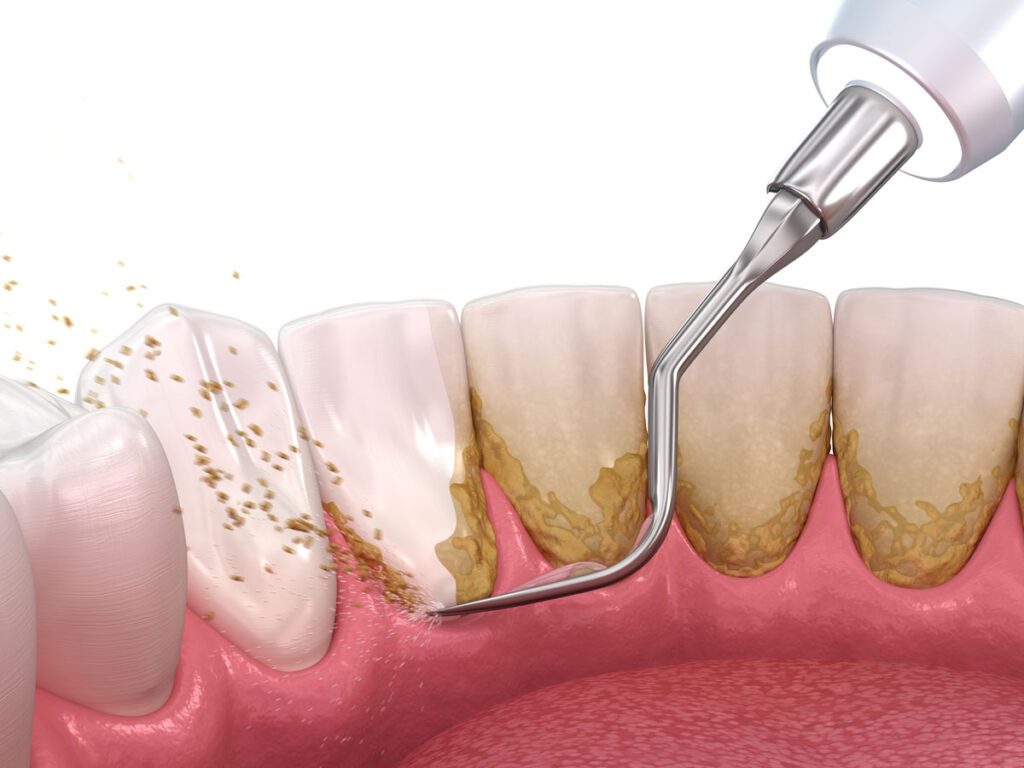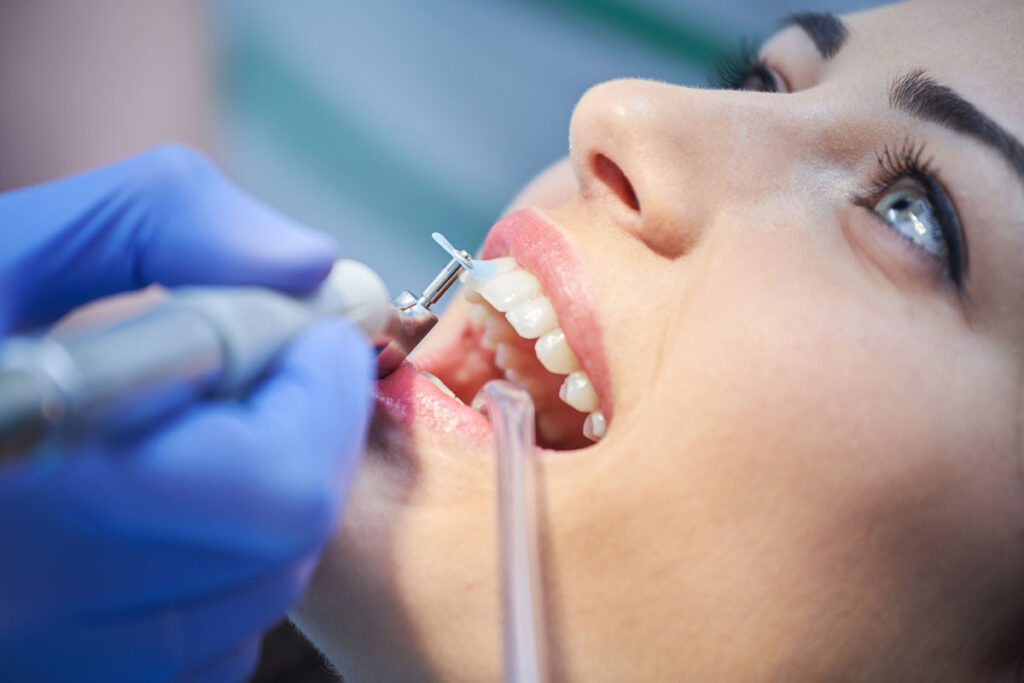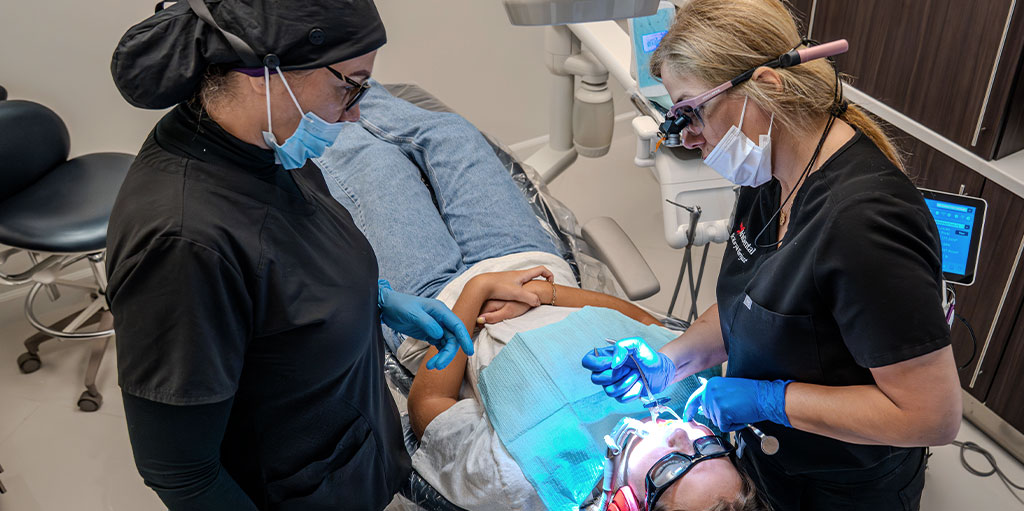Scaling and root planing, or deep dental cleaning, is a standard procedure for removing bacteria and plaque both above and below the gum line. You might be thinking that brushing and flossing do the same. In fact, brushing and flossing are required for healthy teeth and gums and avoid the buildup of plaque and tartar in the mouth, but they may not be enough. Especially for individuals in the early stages of gum disease, deep dental cleaning is a safe method of removing bacteria below the gum line. In this article, we’ll explain more about deep dental cleaning, how it differs from regular cleaning, and the pros and cons.
What Is a Dental Deep Cleaning?
This procedure is like a regular dental cleaning, except that it goes deeper into the gums and removes bacteria, plaque, and tartar from underneath the gums and along the roots of the teeth. Scaling serves to strip plaque and tartar from underneath your teeth and gums. Root planing, on the other hand, smooths the root surfaces of your teeth and reduce the depth of the pockets between your gums and teeth.
Scaling and root planing complement each other to enhance the general health of your gums and teeth, eliminating obstinate plaque and tartar. The outcome is healthy gums and a shining smile. The procedure is a professional one and should be performed by qualified dental professionals only. Dental hygienists (RDH), general dentists (DDS or DMD), and periodontists can deep clean your teeth.
Why Is Deep Dental Cleaning Necessary?
You may ask, “Is a dental deep cleaning ever really necessary?” The answer is a big yes. Regular teeth cleaning is a good way to prevent the accumulation of bacteria and plaque. However, if this accumulation occurs, regular cleaning will no longer be enough.
Deep dental cleaning prevents the development of gum disease and is a good treatment solution for this problem. On the other hand, symptoms such as bad breath and loose teeth are eliminated with this treatment. After deep cleaning, your oral health is restored, and according to holistic dentistry, oral health is related to the body’s health. Deep dental cleaning also helps prevent diseases such as cardiovascular disease, diabetes, and respiratory problems.
After scaling and root planing, surface stains on the teeth and plaque are removed, and your teeth look more beautiful. This can also help improve your self-confidence. So if your dentist recommends this treatment to you, you will receive significant benefits from it.
What Happens During A Tooth Scaling And Root Planning?

Deep cleaning of the teeth can be done in a single visit in one to two hours. However, depending on your condition, the dentist may clean half of your teeth during one appointment and the other half during another appointment. Deep cleaning consists of two procedures: scaling and root planing.
At the beginning of the session, the dentist will inject a local anesthetic to make your gums numb. Then, using special instruments, they will remove plaque and tartar from your tooth surfaces and below the gum line. In the second step, the dentist will remove bacteria from the root surfaces.
After the procedure, the dentist may prescribe antibiotics or medicated mouthwash. they may also recommend over-the-counter pain relievers for the initial day or two to help reduce gum soreness.
What Should I Expect After the Procedure?
It is normal to experience some sensitivity and soreness in your gums for a few days after a deep dental cleaning. However, these symptoms will improve. You may need to revisit your dentist for a follow-up appointment to make sure your gums are healing. In addition, to keep your gums and teeth healthy, brush your teeth at least twice daily and floss once a day. Not smoking and eating a well-balanced diet will also maintain oral health.
What Are the Benefits of Deep Dental Cleaning?
Deep dental cleaning can benefit you in a variety of ways, the most critical of which are listed below:
- Prevents gum recession. If you are experiencing signs of gum disease, it can also lead to gum recession and even tooth loss.
- Treats infection. The cause of infection is bacterial accumulation. Scaling helps the area heal more quickly by eliminating bacteria.
- Removes bad breath. If your mouth smells bad and you can’t get rid of it with regular brushing, deep dental cleaning may be the solution for you.
- Helps your overall health. Bacteria and infections in your mouth can enter your body through your bloodstream, and scaling and root planing can help prevent this from happening.
In general, the longer you wait, the harder gum disease will be to cure, and the more room you have between your teeth and gums, the more bacteria can accumulate there.
What Are the Risks of A Deep Dental Cleaning?
Scaling and root planing usually do not have many side effects or risks. However, you may experience the following side effects:
- Your teeth and gums may be sensitive. Your teeth may be sensitive to hot or cold foods for a while. Your gums may also be slightly sore and inflamed for a few days. The pain usually goes away within a few days, but tooth sensitivity may last for a few weeks.
- There is a slight risk of infection. This is more common in people with weakened immune systems. Your doctor may prescribe antibiotics to prevent the risk of infection.
- There may be some bleeding. Some bleeding is normal after a deep dental cleaning. However, if the bleeding is heavy and does not stop, contact your doctor.
This procedure does not guarantee that the gums that have been separated from the tooth will reattach. Your gums may also have already receded, and you may see more of your tooth roots after the swelling has subsided. However, the benefits of this procedure far outweigh the risks.
What Should I Expect After the Procedure?
It is normal to experience some sensitivity and soreness in your gums for a few days after a deep dental cleaning. However, these symptoms will improve. You may need to revisit your dentist for a follow-up appointment to make sure your gums are healing. In addition, to keep your gums and teeth healthy, brush your teeth at least twice daily and floss once a day. Not smoking and eating a well-balanced diet will also maintain oral health.
What Are the Best Methods for Reducing Sensitivity After the Procedure?

It is recommended to avoid hard, sticky, cold, hot, acidic, and sweet foods for a day or two and choose soft, lukewarm foods. Very hot, very cold, and acidic drinks also have a tendency to trigger tooth sensitivity.
Proper brushing and flossing can speed up the healing and cause gingivitis to go away sooner. So keep good oral hygiene. You can also gargle with warm salt water daily. And finally, if tooth and gum sensitivity bothers you too much, you can take over-the-counter pain relievers, such as acetaminophen, for the first few days after your deep dental cleaning.
What Are Dental Deep Cleaning Alternatives?
Laser treatment is the best alternative for dental deep cleaning. At Aria Dental, we use LANAP treatment. LANAP, or Laser-Assisted New Attachment Procedure, is a minimally-invasive procedure that targets gum disease and leaves no stitches or pain. It’s an FDA-approved and safe procedure, with no radiation or interaction with other medications.
Are You Ready for Your Dental Cleaning?
This article answers questions such as “what is a dental deep cleaning?” “What is the procedure?” “What are the pros and cons?” If you are ready to have your dental deep cleaning in Orange County, we suggest Aria Dental.
Aria Dental recommends holistic, biological treatments that protect the health of the rest of your body as well as your teeth and gum. We are a top certified member of IAOMT (International Academy of Oral Medicine & Toxicology), IABDM (International Academy of Biological Dentistry & Medicine), and HDA (Holistic Dental Association). Contact us to learn more about how we can help you.
FAQ of Dental Deep Cleaning
Does dental deep cleaning hurt?
Dental deep cleaning can be a little uncomfortable, but it is not painful if you choose an experienced doctor.
How long does deep cleaning take?
It mainly depends on the severity of your gum disease. If there is a lot of plaque and tartar, it might take up to two hours.
How often should one opt for dental deep cleaning?
Again, it depends on the severity of your gum disease. It may be recommended once or twice yearly if it’s not a severe gum infection.
Can deep cleaning prevent tooth loss?
Yes, deep cleaning treats gum disease, the leading cause of tooth loss.















